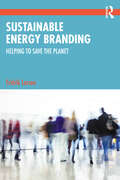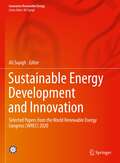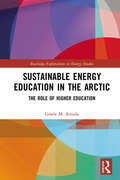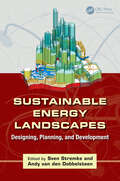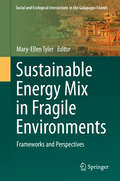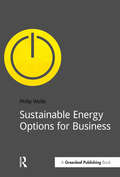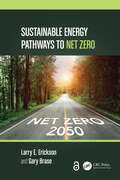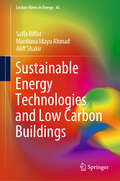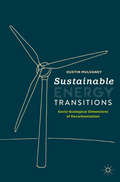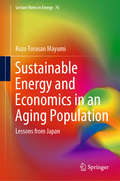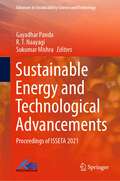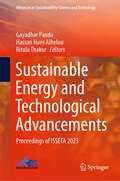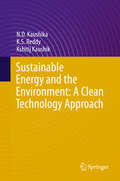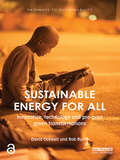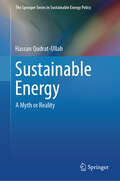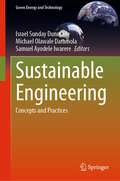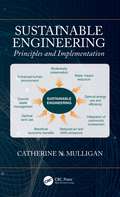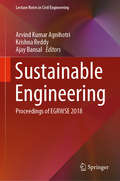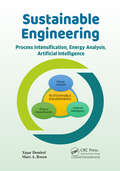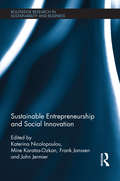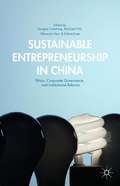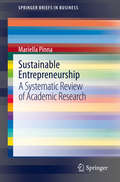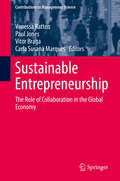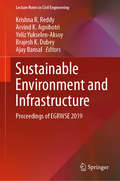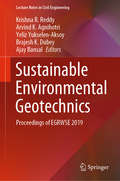- Table View
- List View
Sustainable Energy Branding: Helping to Save the Planet
by Fridrik LarsenSustainable energy branding has become one of the hottest topics in business. As climate change and market liberalisation—the greatest environmental and economic challenges of our times—are prompting the world's power companies to transform on a scale never seen before, the eyes of the world are firmly upon them. By introducing new business models, as well as new ways of generating power, energy-sector giants are aiming to dramatically cut harmful emissions over the next few decades. Crucial to the success of this transition is the support of energy consumers and political decision-makers, and this challenge should not be underestimated. Power companies are, therefore, developing new marketing and communication strategies around renewable energy, sustainable growth, co-operation with customers and environmental protection. Fridrik Larsen, the world’s foremost expert on energy branding, looks at the role of branding and marketing in the energy transition through a series of interviews with senior energy-sector executives. These compelling insights from industry leaders make this book a must-read for marketing and C-suite executives at energy companies who are wanting to communicate sustainable and renewable energy solutions effectively to make a difference.
Sustainable Energy Development and Innovation: Selected Papers from the World Renewable Energy Congress (WREC) 2020 (Innovative Renewable Energy)
by Ali SayighThis book contains selected papers presented during the World Renewable Energy Congress (WREC) 2020 at the Instituto Superior Técnico in Lisbon. The WREC is dedicated to promoting renewable energy global development, and features top international experts, policy makers, scientists, engineers, technology developers, and business practitioners addressing the most current research and technological breakthroughs in sustainable energy development and innovation. The contributions address policy and renewable energy technologies and applications in all sectors—for heating and cooling, agricultural applications, water, desalination, industrial applications, and for the transport sectors.Presents cutting-edge research in green building and renewable energy from all over the world;Covers the most up-to-date research developments, government policies, business models, best practices, and innovations;Contains case studies and examples to enhance practical application of the technologies.
Sustainable Energy Education in the Arctic: The Role of Higher Education (Routledge Explorations in Energy Studies)
by Gisele M. ArrudaThis book examines the nature of the ‘energy curriculum’ in Arctic Higher Education and provides invaluable data and new models to assess levels of Sustainable Development Literacy. Drawing on course mapping conducted in Higher Education institutions across the Arctic, Arruda looks at the nature, structure, and design of the Arctic Higher Education curriculum in order to assess levels of Sustainable Development Literacy and considers the extent to which Arctic Higher Education courses align to UNESCO Education for Sustainable Development (ESD). Using data from four key case studies in Norway, Canada, and the US, and applying a framework drawn from different knowledge systems (Traditional Knowledge and Western educational system), she analyses the different educational approaches and pedagogies used and specifically considers how Higher Education in this region can contribute to the accomplishment of Sustainable Development and the Sustainable Development Goals. The book concludes by proposing new models to assess Higher Education adherence to ESD and outlines how a culturally inclusive curriculum can invite different groups of people to engage in a meaningful Sustainable Development debate, learning experience, and knowledge application. This innovative volume will be of great interest to multicultural students, scholars, and educators of Sustainable Development, climate change, energy, Arctic studies, and global Higher Education across the Arctic and non-Arctic nations.
Sustainable Energy Landscapes: Designing, Planning, and Development
by Sven Stremke Andy van den DobbelsteenIn the near future the appearance and spatial organization of urban and rural landscapes will be strongly influenced by the generation of renewable energy. One of the critical tasks will be the re-integration of these sustainable energy landscapes into the existing environment-which people value and want to preserve-in a socially fair, environmenta
Sustainable Energy Mix in Fragile Environments: Frameworks and Perspectives (Social and Ecological Interactions in the Galapagos Islands)
by Mary-Ellen TylerThe purpose of this book is to present a range of cases and comparison of the issues, insights and cases emerging from the Sustainable Energy Mix Summit in the Galapagos that offer a better understanding of energy mix in fragile environments from a variety of International locations and contexts including the Galapagos.
Sustainable Energy Options for Business (Doshorts Ser.)
by Philip WolfeThe major environmental impact of most businesses derives from energy usage. The upside of this is that using energy more responsibly improves profitability. A business’s cheapest unit of energy is also the one which is least damaging to the planet: the unit you don't use.There are many ways to make your organization's energy usage more sustainable. In Sustainable Energy Options for Business, Philip Wolfe outlines the best available options for (1) reducing energy use and (2) improving the sustainability of energy supply. After an introduction to regulatory drivers and management issues, Wolfe looks at energy opportunities in five key areas: 1. Saving on energy usage; 2. Finding more sustainable sources of energy; 3. Generating renewable electricity; 4. Producing renewable heat; 5. Indirect energy sustainability options.Also included: An "energy checklist" to help identify your best options and important quick wins, plus a handy reference list, signposted from annotations in the text.
Sustainable Energy Pathways to Net Zero
by Larry E. Erickson Gary BraseSustainable Energy Pathways to Net Zero addresses realistic pathways between now and 2050 to reach net zero: a steady state concentration of greenhouse gases in the atmosphere. It discusses solar and wind energy, hydrogen, energy storage, and electric vehicles, all of which are becoming an increasingly cost-efficient part of these pathways. Hydrogen, the price of electricity, the integration of different sources of electricity into the electrical grid, and the electric vehicle charging networks are crucial in balancing supply and demand. This book describes how these different energy factors fit together. It emphasizes the fact that the intersection of these technologies is where the most profound advances can occur.Features: Emphasizes the importance of demand management for electricity and reducing cost. Explains the economics of reaching net zero emissions and the role of innovation and public policies, among others. Discusses the cost and efficiency of solar and wind power, electric vehicles, and storage technologies, and describes the benefits of battery swapping. Focuses on the role of integration of different sources of electricity into the electrical grid as an important part of the pathway. Recommends research and development on electrochemical processes to remove carbon from the ocean. Written in a simple language for a general audience and understandable for a global market. Is Open Access to encourage global use. This book is a great resource for government and industry professionals involved in energy production and management, as well as academics and students in science and engineering interested in the pathways to sustainable development. The Open Access version of this book, available at http://www.taylorfrancis.com, has been made available under a Creative Commons Attribution-Non Commercial-No Derivatives (CC-BY-NC-ND) 4.0 license.
Sustainable Energy Technologies and Low Carbon Buildings (Lecture Notes in Energy #45)
by Mardiana Idayu Ahmad Saffa Riffat Aliff ShakirThis book aims to offer an in-depth guide and fundamental comprehension of sustainable energy technologies and their essential function in decreasing energy consumption in buildings under diverse climatic conditions. It has been designed to stimulate additional research and innovation, especially in the field of green technology for building applications. This book embodies the culmination of extensive research and case studies, encompassing the initial developments to the latest advancements in sustainable energy systems, particularly emphasising energy-efficient building technologies. It also highlights up-to-date reviews and research into meeting low and zero carbon demand in buildings and includes extensive coverage of established and emerging sustainable energy technologies for building applications, addressing their physical principles, mechanisms, applications, and cutting-edge technological advances. The coverage of book is divided into five main parts: Thermal energy-efficient systems; Sustainable power generation; Energy-efficient lighting technologies; Zero-energy and low carbon buildings and; Eco-cities as sustainable urban living. Taken together, they provide a concise explanation of low and zero carbon buildings’ role in tackling the world’s energy challenges, with an emphasis on design, conversion techniques, and materials and on the economic and environmental assessment of technology. Innovative concepts, design, and planning in connection with global urbanization and improving sustainable development are also discussed. In addition, the book features case studies on worldwide sustainable energy technologies, low and zero carbon buildings, and eco-cities as sustainable urban environments. This book offers a valuable source of information for developers, architects, building managers and owners, and engineers working in sustainable energy fields, as it provides in-depth information on a diverse range of technologies designed to achieve environmentally friendly solutions. The book also benefits students and academics, as it offers optimal supporting material for an introductory course in this field.
Sustainable Energy Transitions: Socio-Ecological Dimensions of Decarbonization
by Dustin MulvaneyThis textbook introduces the key concepts that underpin sustainable energy transitions. Starting with the basic biophysical principles, current sources and environmental consequences of existing energy resource use, the book takes readers through the key questions and topics needed to understand, prescribe, and advocate just and sustainable energy solutions. The interdisciplinary nature of the book aims to build bridges across the social and natural sciences and humanities, bringing together perspectives, ideas and concepts from engineering, economics, and life cycle assessment to sociology, political science, anthropology, policy studies, the humanities, arts, and some interdisciplinary thinkers that defy categories. This accessible approach fills the gap for a textbook that integrates sustainability science and engineering studies with strong empirical social science and it will be a useful tool to anyone interested in the socio-ecological dimensions of energy system transitions.
Sustainable Energy and Economics in an Aging Population: Lessons from Japan (Lecture Notes in Energy #76)
by Kozo Torasan MayumiThis book discusses current challenges in Japan, focusing on the nation’s rapidly aging population and low birth rate, along with persistent public bond issues with heavy interest payments, the potential collapse of social security systems, and income inequality, as well as the global picture. In turn, it examines the accessibility of global fossil fuels and feasibility of large-scale solar energy use. A new theory of money, interest, and capital is put forward, together with a proposal for an alternative system of international monetary cooperation, to promote a more sustainable and equitable world. Specific topics discussed include • the inverted population pyramid, due to the dramatic change in human life spans and declining birth rates; • the rapidly shrinking workforce, aging population, and declining GDP share sourced from industry; • disproportionate debt expansion due to public bond issues and coping with a persistent budget deficit; • the potential collapse of social security systems combined with income inequality; and • how to mitigate these bio-economic predicaments. Global Energy Sources offers an essential guide for policymakers, economists, researchers, and all those concerned with establishing a sustainable and equitable society from both energy and monetary perspectives. Further, it will be of interest to readers around the world, as the lessons learned from Japan are crucial to other developed societies that may eventually face the same types of challenge.
Sustainable Energy and Technological Advancements: Proceedings of ISSETA 2021 (Advances in Sustainability Science and Technology)
by Sukumar Mishra Gayadhar Panda R. T. NaayagiThis book contains selected papers presented at the First International Symposium on Sustainable Energy and Technological Advancements (ISSETA 2021), which was organized by the Department of Electrical Engineering, NIT Meghalaya, Shillong, India, during September 24–25, 2021. The topics covered in the book mainly focuses on the cutting-edge research domain with respect to sustainable energy technologies, smart building, integration, and application of multiple energy sources; advanced power converter topologies and their modulation techniques; and information and communication technologies for smart microgrids.
Sustainable Energy and Technological Advancements: Proceedings of ISSETA 2023 (Advances in Sustainability Science and Technology)
by Hassan Haes Alhelou Gayadhar Panda Ritula ThakurThis book contains selected papers presented at Second International Symposium on Sustainable Energy and Technological Advancements (ISSETA 2023), organized by the Department of Electrical Engineering, NIT Meghalaya, Shillong, India, during February 24–25, 2023. The topics covered in the book are the cutting-edge research involved in sustainable energy technologies, smart building technology, integration and application of multiple energy sources; advanced power converter topologies and their modulation techniques; and information and communication technologies for smart micro-grids.
Sustainable Energy and the Environment: A Clean Technology Approach
by N. D. Kaushika K. S. Reddy Kshitij KaushikThis book emerges from the recognition that energy, environment and ecosystems are dynamically and inextricably connected. The energy environment system must be addressed in its totality, so that we can devise sustainable solutions that incorporate both economic growth and environmental conservation. No single clean energy source will sustain long-term energy security, and fossil fuels will remain prominent in the mix of energy sources for several decades to come. Energy solutions, therefore, must employ a broad and diverse range of approaches, including cleaner fossil fuel technologies, and an affordable transition to greener power generation employing waste, water and renewable resources. Moreover, adapting to this changing global energy picture will require a transformational shift in the ways we use and deliver energy services. The authors begin with a broad introductory chapter on sustainable energy and the environment, classifying energy resources, cataloging environmental degradations, and outlining the concepts and practices of sustainability. In Chapters Two and Three, they summarize the basic constituents of the environment, the biosphere and its natural cycles, and offer a model of Earth's planetary temperatures and the greenhouse effect. Chapters Four and Five outline conventional energy and power systems, and related environmental degradations. The next several chapters cover clean coal technologies for power generation, and discuss sustainable energy and power technologies based on both thermal and photovoltaic solar energy, along with biomass and wind. The final chapters examine in depth the management of waste and water, pollution control and energy conservation. The book introduces a unique approach to sustainability and energy conservation which emphasizes the relationships between underlying scientific principles and practical applications employed in engineering solutions. All this is offered in a form that matches the requirements of college-level environmental science and engineering courses.
Sustainable Energy for All: Innovation, technology and pro-poor green transformations (Pathways to Sustainability)
by David Ockwell Rob ByrneDespite decades of effort and billions of dollars spent, two thirds of people in sub-Saharan Africa still lack access to electricity, a vital pre-cursor to economic development and poverty reduction. Ambitious international policy commitments seek to address this, but scholarship has failed to keep pace with policy ambitions, lacking both the empirical basis and the theoretical perspective to inform such transformative policy aims. Sustainable Energy for All aims to fill this gap. Through detailed historical analysis of the Kenyan solar PV market the book demonstrates the value of a new theoretical perspective based on Socio-Technical Innovation System Building. Importantly, the book goes beyond a purely academic critique to detail exactly how a Socio-Technical Innovation System Building approach might be operationalized in practice, facilitating both a detailed plan for future comparative research as well as a clear agenda for policy and practice. These plans are based on a systemic perspective that is more fit for purpose to inform transformative policy ambitions like the UN’s Sustainable Energy for All by 2030 initiative and to underpin pro-poor pathways in sustainable energy access. This book will be of interest to academic researchers, policy makers and practitioners in the field of sustainable energy access and low carbon development more broadly.
Sustainable Energy: A Myth or Reality (The Springer Series in Sustainable Energy Policy)
by Hassan Qudrat-UllahThis book embarks on a transformative journey through the complex landscape of renewable energy, challenging prevailing myths and uncovering the realities that define our energy future. At the heart of this exploration lies the dynamic intersection of technology and sustainability, spotlighting the critical nexus where innovation meets eco-conscious solutions. Far from a mere debunking exercise, this book unfolds as a comprehensive narrative, weaving through the complex tapestry of challenges and opportunities that define the sustainable energy paradigm. Unravelling misconceptions surrounding sustainable energy, the book places a particular emphasis on renewable sources like solar and wind, providing a profound understanding that extends beyond the surface. Engaging case studies and examples punctuate the narrative, offering a firsthand glimpse into the practical applications and challenges of sustainable energy projects. Designed for a diverse readership, the book speaks to: (i) Students and teachers: Delving into the scientific and technical intricacies of sustainable energy sources, along with their broader environmental, social, and economic impacts. (ii) Researchers and professionals: Offering an up-to-the-minute guide to the latest developments and trends in the ever-evolving field of sustainable energy. (iii) Policy makers and activists: Providing a nuanced exploration of the facts and evidence underpinning sustainable energy, alongside an insightful examination of the myths and misconceptions that surround it. (iv) General readers: Inviting all who seek to broaden their knowledge and awareness of sustainable energy, understanding its profound relevance and importance for the collective future of humanity and the planet. This book isn't just a journey; it's a call to action. As you turn the pages, you're not only gaining knowledge but becoming part of a movement toward a resilient and eco-friendly tomorrow. Embrace the future of energy – informed, inspired, and empowered.
Sustainable Engineering: Concepts and Practices (Green Energy and Technology)
by Israel Sunday Dunmade Michael Olawale Daramola Samuel Ayodele IwarereSustainable Engineering: Concepts and Practices provides insights into current perspectives on sustainable engineering research. It highlights the drivers, motivations, and challenges affecting the development and adoption of sustainable engineering in various sectors of the economy and how they impact sustainable development. Contributions from researchers representing multiple branches of engineering in academia, government laboratories, and industry present alternative approaches to traditional engineering practices. These approaches effect change, making the design, construction, production, and management of products, processes, and systems more environmentally friendly, socially beneficial, and economically profitable. The book will be a trusted reference for graduate students, practicing engineers, and other professionals interested in developing or using sustainable products and systems.
Sustainable Engineering: Principles and Implementation
by Catherine MulliganSustainable Engineering: Principles and Implementation provides a comprehensive overview of the interdisciplinary field of sustainability as it applies to engineering and methods for implementation of sustainable practices. Due to increasing constraints on resources and on the environment and effects of climate change, engineers are being faced with new challenges. While it is generally believed that the concepts of sustainable design must be adhered to so that future generations may be protected, the execution and practice of these concepts are very difficult. It is therefore the focus of this book to give both a conceptual understanding as well as practical skills to apply sustainable engineering principles to engineering design. This book introduces relevant theory, principles, and ethical expectations for engineers, presents concepts related to industrial ecology, green engineering, and eco-design, and details frameworks that indicate the challenges and constraints of applying sustainable development principles. It describes the tools, protocols, and guidelines that are currently available through case studies and examples from around the world. The book is designed to be used by undergraduate and graduate students in any engineering program (with particular emphasis on civil, environmental and chemical engineering) and other programs in which sustainability is taught, in addition to practicing scientists and engineers and all others concerned with the sustainability of products, projects and processes. Specific Features: Discusses sources of contaminants and their impact on the environment Addresses sustainable assessment techniques, policies, protocols and guidelines Describes new tools and technologies for achieving sustainable engineering Includes social and economic sustainability dimensions Offers case studies demonstrating implementation of sustainable engineering practices
Sustainable Engineering: Proceedings of EGRWSE 2018 (Lecture Notes in Civil Engineering #30)
by Arvind Kumar Agnihotri Ajay Bansal Krishna ReddyThis volume contains selected papers presented during the International Conference on Environmental Geotechnology, Recycled Waste Material and Sustainable Engineering (EGRWSE-2018). The multidisciplinary articles in this volume discuss environment-friendly technologies and the application of 'smart' solutions and initiatives to improve infrastructure and services, with a strong emphasis on sustainability and conservation of resources. This volume will be of interest to engineers, professionals, and researchers working on improving urban infrastructure and strengthen civic amenities in a sustainable manner.
Sustainable Engineering: Process Intensification, Energy Analysis, and Artificial Intelligence
by Marc A. Rosen Yasar DemirelSustainable engineering is of great importance for resilient and agile technology and society. This book balances economics, environment, and societal elements of sustainable engineering by integrating process intensification, energy analysis, and artificial intelligence to reduce production costs, improve the use of material and energy, product quality, safety, societal well-being, and water usage. The book provides comprehensive discussion of topics on process intensification, energy analysis, and artificial intelligence that include optimization, energy integration, green engineering, pinch analysis, exergy analysis, feasibility analysis, life cycle assessment, circular economy, bioeconomy, data processing, machine learning, expert systems, digital twins, and self-optimized plants for sustainable engineering.
Sustainable Entrepreneurship and Social Innovation (Routledge Research in Sustainability and Business)
by Mine Karatas-Ozkan Katerina Nicolopoulou Frank Janssen John M. JermierSustainable entrepreneurship has attracted growing attention in both scholarly and practitioner circles. Focusing on generating social, environmental and business value, the notion has been raised more recently to address the contribution of entrepreneurial activities to sustainable economic and social development.Sustainable Entrepreneurship and Social Innovation builds on a theoretical framework that addresses related topics via a combination of insights from sustainability, policy, managerial, strategic, innovation and institutional perspectives. Providing empirical casework as well as a conceptual and theoretical framework, the book takes a global, interdisciplinary approach to the emergent field of sustainable entrepreneurship. The book highlights elements of sustainable entrepreneurship which have a societal impact as well as regional relevance and related aspects of innovation are also presented. Definitional issues are further elaborated in order to encompass the main inter-connected fields of study, sustainable entrepreneurship and social innovation.This book is an important resource for academic researchers, and postgraduate and advanced undergraduate students in the fields of entrepreneurship, innovation and sustainability.
Sustainable Entrepreneurship in China
by Edward Lee Douglas Cumming Wenxuan Hou Michael FirthThere is an intense love–hate relationship between entrepreneurship and business ethics, and transitional economies provide fertile ground to examine these issues, especially within emerging markets. While institutional reform and governance assist entrepreneurship, the competition among Chinese entrepreneurs also serves as catalysts for further reform and governance improvement. Therefore, there is an interrelationship between business ethics, entrepreneurship, corporate governance,and institutional reform associated with China's past, current, and future economic development. Sustainable Entrepreneurship in China provides empirical evidence and cutting-edge research into topical business ethics issues relating to entrepreneurship, corporate governance, and institutional reforms in China. As a leading emerging economy, analysis of Chinese data provides useful policy implications for China, as well as other developing economies, on the ethical aspects of talent acquisition, venture capital investment, and corporate governance.
Sustainable Entrepreneurship: A Systematic Review of Academic Research (SpringerBriefs in Business)
by Mariella PinnaThis book examines the current body of knowledge on sustainable entrepreneurship. Using network and content analysis, the author maps the structure of the research field and provides a systematic review. In this regard, network analysis is used to find evidence of thematically related clusters of publications and polarizing differences across the subfields of inquiry. In contrast, content analysis is employed to identify and address emerging gaps in the literature. In particular, after discussing mainstream contributions, the author focuses on pioneering research and predicts possible paths that might challenge researchers in the future. The author contributes to the ongoing debate on the definition and boundaries of the flourishing field of sustainable entrepreneurship, by offering critical insights and possible future development pathways derived from both quantitative and qualitative analyses.
Sustainable Entrepreneurship: The Role Of Collaboration In The Global Economy (Contributions to Management Science)
by Paul Jones Vanessa Ratten Vitor Braga Carla Susana MarquesSustainable entrepreneurship focuses on how the environment is embedded within business practices. This book examines collaboration strategies and initiatives for sustainable entrepreneurs with a wide variety of partners, and demonstrates how they can be used to increase overall performance and achieve global competitiveness. Based on the latest empirical evidence from emerging economies, the book’s respective chapters address sustainability issues in connection with knowledge creation and learning, outsourcing, and the roles of universities, consultants, and the public sector.
Sustainable Environment and Infrastructure: Proceedings of EGRWSE 2019 (Lecture Notes in Civil Engineering #90)
by Krishna R. Reddy Ajay Bansal Arvind K. Agnihotri Yeliz Yukselen-Aksoy Brajesh K. DubeyThis volume contains selects papers presented during the 2nd International Conference on Environmental Geotechnology, Recycled Waste Materials and Sustainable Engineering, held in the University of Illinois at Chicago. It covers the recent innovations, trends, and concerns, practical challenges encountered, and the solutions adopted in waste management and engineering, geotechnical and geoenvironmental engineering, infrastructure engineering, and sustainable engineering. This book will be useful for academics, educators, policy makers and professionals working in the field of civil engineering, chemical engineering, environmental sciences and public policy.
Sustainable Environmental Geotechnics: Proceedings of EGRWSE 2019 (Lecture Notes in Civil Engineering #89)
by Krishna R. Reddy Ajay Bansal Arvind K. Agnihotri Yeliz Yukselen-Aksoy Brajesh K. DubeyThis volume contains selects papers presented during the Second International Conference on Environmental Geotechnology, Recycled Waste Materials and Sustainable Engineering, held in the University of Illinois at Chicago. It covers the recent innovations, trends, and concerns, practical challenges encountered, and the solutions adopted in geoenvironmental engineering, waste management, and sustainable engineering. This book will be useful for academics, educators, policy makers and professionals working in the field of civil engineering, chemical engineering, environmental sciences and public policy.
